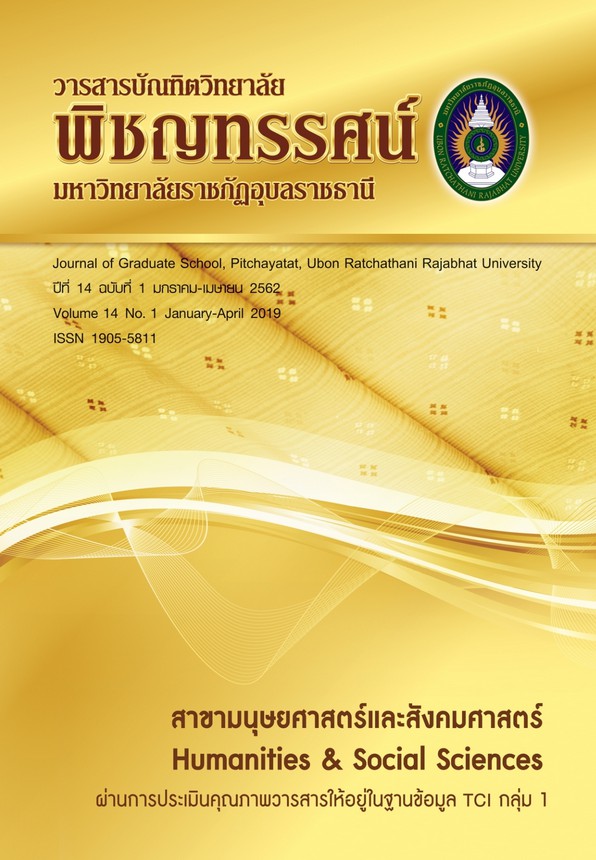การพัฒนาหลักสูตรเสริมตามแนวคิดเมตาคอกนิชันและการเรียนรู้โดยใช้บริบทเป็นฐานเพื่อเสริมสร้างทักษะและกระบวนการทางคณิตศาสตร์ของนักเรียนชั้นมัธยมศึกษาปีที่ 5
คำสำคัญ:
หลักสูตรเสริม, ทักษะและกระบวนการทางคณิตศาสตร์, เมตาคอกนิชัน, การเรียนรู้แบบอิงบริบทเป็นฐานบทคัดย่อ
การวิจัยครั้งนี้มีวัตถุประสงค์เพื่อ 1) ศึกษาข้อมูลพื้นฐานในการพัฒนาหลักสูตรเสริมตามแนวคิดเมตาคอกนิชันและการเรียนรู้โดยใช้บริบทเป็นฐานเพื่อเสริมสร้างทักษะและกระบวนการทางคณิตศาสตร์ ของนักเรียนชั้นมัธยมศึกษา ปีที่ 5 2) พัฒนาหลักสูตรเสริมตามแนวคิดเมตาคอกนิชันและการเรียนรู้โดยใช้บริบทเป็นฐาน 3) เปรียบเทียบทักษะและกระบวนการทางคณิตศาสตร์ของนักเรียนก่อนและหลังทดลองและหลังทดลองเทียบกับเกณฑ์ร้อยละ 75 และ 4) เปรียบเทียบเจตคติต่อคณิตศาสตร์ก่อนและหลังการทดลอง การพัฒนาหลักสูตรมี 4 ขั้นตอนคือ 1) ศึกษาข้อมูลพื้นฐาน 2) สร้างหลักสูตร 3) ทดลองใช้หลักสูตร และ 4) ปรับปรุงหลักสูตร กลุ่มตัวอย่างสำหรับศึกษาข้อมูลพื้นฐานในการพัฒนาหลักสูตรคือนักเรียน 100 คน ครูผู้สอน 20 คน และผู้ทรงคุณวุฒิ 5 คน โดยใช้แบบสอบถามความคิดเห็น กลุ่มตัวอย่างในการทดลองคือนักเรียนชั้นมัธยมศึกษาปีที่ 5 โรงเรียนพังโคนวิทยาคม สังกัดสำนักงานเขตพื้นที่การศึกษามัธยมศึกษาเขต 23 ภาคเรียนที่ 1 ปีการศึกษา 2560 จำนวน 20 คน ได้มาโดยการสุ่มแบบหลายขั้นตอน เครื่องมือที่ใช้ในการเก็บรวบรวมข้อมูลพื้นฐานคือแบบสอบถาม เครื่องมือที่ใช้ในการทดลอง คือ แผนการจัดการเรียนรู้ แบบวัดทักษะและกระบวนการทางคณิตศาสตร์ และแบบวัดเจตคติ สถิติที่ใช้ในการวิเคราะห์ข้อมูล คือ ค่าเฉลี่ยเลขคณิต ส่วนเบี่ยงเบนมาตรฐาน และค่าทดสอบทีแบบกลุ่มสัมพันธ์ ผลการวิจัยพบว่า 1. ข้อมูลพื้นฐานโดยภาพรวม นักเรียน ครูผู้สอน และผู้ทรงคุณวุฒิต้องการส่งเสริมและพัฒนาหลักสูตรเสริมอยู่ในระดับมาก (=4.35) รายด้านพบว่า ด้านการวัดผลและประเมินผลอยู่ในระดับมากที่สุด (
=4.50) ด้านทักษะและกระบวนการทางคณิตศาสตร์อยู่ในระดับมาก (
=4.47) และด้านเนื้อหาและกิจกรรมการเรียนรู้อยู่ในระดับมาก (
=4.08) 2. หลักสูตรเสริมที่พัฒนาขึ้น มี 6 องค์ประกอบ ได้แก่ 1) ทฤษฎีและแนวคิดพื้นฐาน 2) หลักการ 3) จุดมุ่งหมาย 4) เนื้อหา 5) การจัดกิจกรรมการเรียนรู้ และ 6) การวัดผลและประเมินผล โดยเนื้อหาประกอบด้วย 3 หน่วยการเรียนรู้ ใช้เวลาเรียน 27 ชั่วโมง ได้แก่ 1) เซตในสถานการณ์ชีวิตประจำวัน 2) สามเหลี่ยมมุมฉากและอัตราส่วนตรีโกณมิติในสถานการณ์ชีวิตประจำวัน และ 3) ลำดับและอนุกรมในสถานการณ์ชีวิตประจำวัน การจัดกิจกรรมการเรียนรู้ ประกอบด้วย 4 ขั้นตอน ได้แก่ ขั้นที่ 1 กำหนดสถานการณ์ ขั้นที่ 2 ลงมือปฏิบัติงานประกอบด้วยขั้นย่อย 4 ขั้น ได้แก่ เริ่มต้น จัดเตรียม กระทำให้สำเร็จ และตรวจสอบ ขั้นที่ 3 เรียนรู้แนวคิดสำคัญ และขั้นที่ 4 นำไปใช้ในสถานการณ์ใหม่ 3. ทักษะและกระบวนการทางคณิตศาสตร์ของนักเรียนหลังการทดลองสูงกว่าก่อนการทดลองและสูงกว่าเกณฑ์ร้อยละ 75 อย่างมีนัยสำคัญทางสถิติที่ .01 4. เจตคติต่อคณิตศาสตร์ของนักเรียนหลังการทดลองสูงกว่าก่อนการทดลองอย่างมีนัยสำคัญทางสถิติที่ .01
เอกสารอ้างอิง
จันทร์ขจร มะลิจันทร์. ผลของการจัดการเรียนรู้ที่เน้นกระบวนการคิดเชิงเมตาคอกนิชัน ที่มีต่อความสามารถในการแก้ปัญหาคณิตศาสตร์ ความตระหนักในการรู้คิดและการกำกับตนเองในการเรียน ของนักเรียนชั้นมัธยมศึกษาปีที่ 5 เรื่อง วิธีเรียงสับเปลี่ยนและวิธีการจัดหมู่. วิทยานิพนธ์การศึกษามหาบัณฑิต มหาวิทยาลัยศรีนครินทรวิโรฒ, 2554.
ฉวีวรรณ เศวตมาลย์. การพัฒนาหลักสูตรคณิตศาสตร์. กรุงเทพฯ: สุวีริยาสาส์น, 2545.
ธรรมนัด โถบำรุง. การศึกษาความตระหนักในการคิดในระหว่างการแก้ปัญหาทางคณิตศาสตร์จาก การเขียนอธิบายของนักเรียน. วารสารวิจัย มข. 8, 1 (มกราคม-มีนาคม 2551): 117-124.
พาสนา จุลรัตน์. เมตาคอกนิชันกับการเรียนรู้. วารสารวิชาการศึกษาศาสตร์. 14, 1 (มกราคม-มิถุนายน 2556) :1-17.
สงัด อุทรานันท์. พื้นฐานและหลักการพัฒนาหลักสูตร. กรุงเทพฯ: มิตรสยาม, 2532.
ส่งเสริมการสอนวิทยาศาสตร์และเทคโนโลยี, สถาบัน. การวัดผลประเมินผลคณิตศาสตร์. กรุงเทพฯ: ซีเอ็ดยูเคชั่น, 2555(ก).
............. ทักษะและกระบวนการทางคณิตศาสตร์. พิมพ์ครั้งที่ 3. กรุงเทพฯ : 3-คิว มีเดีย, 2555 (ข).
............. การวัดผลประเมินผลคณิตศาสตร์. กรุงเทพฯ: ซีเอ็ดยูเคชั่น, 2555 (ค).
สิริพร ทิพย์คง. หลักสูตรและการสอนคณิตศาสตร์. กรุงเทพฯ: พัฒนาคุณภาพวิชาการ, 2545.
Beyer, B.K. Practical Strategies for Teaching of Thinking. Boston: Allyn and Bacon, 1987.
Biryukov, P [n.d.]. Metacognitive Aspects of Solving Combinatorics Problems. (Online) 2005 (Cite 2005 May 17). Available from: http://www.ex.ac.uk/cimt/ijmtl/biryukov.pdf
Darkwah, V.A. Undergraduate nursing students’ level of thinking and self-efficacy in patient education in a Context-Based learning Program. Dissertation University of Alberta Canada, 2006.
Flavell, J.H. Metacognition and Cognitive Monitoring: A New Area of Cognitive Development Inquiry. American Psychologist. 34,10 (1979): 906-911.
Garofalo, J., and Lester, FK. Metacognition, Cognitive Monitoring, And Mathematical Performance. Journal for Research in Mathematics Education. 16, 3 (1979): 163-176.
Hembree, R. Experiments and Relational Studies in Problem Solving : A Meta-Analysis. Journal for Research in Mathematics Education. 23 (1992): 242-273.
ดาวน์โหลด
เผยแพร่แล้ว
รูปแบบการอ้างอิง
ฉบับ
ประเภทบทความ
สัญญาอนุญาต
บทความทุกเรื่องได้รับการตรวจความถูกต้องทางวิชาการโดยผู้ทรงคุณวุฒิภายนอกอย่างน้อย 3 คน ความคิดเห็นในวารสารพิชญทรรศน์เป็นความคิดเห็นของผู้นิพนธ์มิใช่ความคิดเห็นของผู้จัดทำ จึงมิใช่ความรับผิดชอบของวารสารพิชญทรรศน์ และบทความในวารสารพิชญทรรศน์สงวนสิทธิ์ตามกฎหมายไทย การจะนำไปเผยแพร่ต้องได้รับอนุญาตเป็นลายลักษณ์อักษรจากกองบรรณาธิการ





